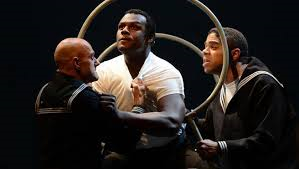When Oil & Water Mix
When introducing Oil and Water on opening night, the Grand’s artistic director Susan Ferley described it as “profound, playful, powerful”. As the true story of a disaster off the coast of Newfoundland it is profound. When the results of this disaster turned into something very positive, this play is powerful. And it has some playful moments.
The tale is compelling – in 1944 an American naval vessel sinks offshore at St. Lawrence, Newfoundland in a freezing February snow storm. Of the 156 sailors on board, only 46 survive, swimming to shore in the frigid water. Only one of the two African-American sailors on board lives, rescued by the men of St. Lawrence.
The play, Oil and Water is the story of that one African-American, Lanier Phillips. The audience is moved around his life – from his great grandmother who was born into slavery, to Newfoundland in World War II, and to Boston in 1974 when his daughter is bussed to an integrated school.
Lanier has a difficult life facing racism: he’s born in the 1930s and life is not so different from when his great-grandmother was a slave. When the Second World War breaks out, he joins the Navy in order to escape the cruel racism of the U.S. south. But things are no better in the Navy – as a black man, he is treated crudely by his peers of the same rank, until his ship runs aground in Newfoundland. The ship founders and the tanks on board leak oil into the water. There is no room for a black man in the life boats, so he is forced to swim through the cold oily water to shore. Somehow he makes it and is picked up by the hardworking Newfoundland miners. The townswomen set to work, warming up the survivors and cleaning the oily tar off their skin.
When they get to Lanier, they scrub harder, trying to clean off his skin. He comes to, just in time to tell them that they won’t be able to make him white. Having never seen a black person, the women are enthralled. Lanier doesn’t see the hatred that he usually sees in white people’s eyes. He is dumbfounded when they treat him just like the white men they rescued.
As the result of the equality he experienced in Newfoundland, Lanier becomes a fighter for civil rights in the U.S., encouraging his daughter when she is forced to ride the bus to an integrated school.
Anderson Ryan Allen is excellent as the angry, young Lanier Phillips, while Jeremiah Sparks gives a solid interpretation of the older Lanier looking after his daughter. Neema Bickersteth is the Great Grandmother, the slave who was freed, and appears throughout the play as Lanier’s guardian angel with an ethereal quality. The two Newfoundland women, played by Petrina Bromley and Alison Woolridge, are excellent. Their stalwart personalities are evident. Jody Richardson and Mark Power give strong performances as the men of St. Lawrence. Mark Pyette and Clint Butler round out the cast as sailors. Starr Domingue struggles with her part as Lanier’s daughter Vonzia. Her dialogue is awkward: it doesn’t sound like a kid of the 70s, and she seems unable to get comfortable in the role of a child.
The background music which consisted of humming is meant to sound like workers in the cotton fields of the Deep South. Unfortunately, it often becomes distracting, sometimes drowning out what’s being said on stage.
This story is powerful enough to stand on its own. It wasn’t necessary for the playwright to mix up the order, a technique that is used when there’s a need to build suspense. A straight-forward telling, with one actor playing Lanier throughout, would have been more intriguing as we saw the change in the character.
As a true story, is it is indeed profound. A man’s life was almost cut short and then took a sweeping turn. And the playfulness – the scrubbing, trying to make that dark skin light, or the embarrassment of helping a grown man put on his boxer shorts – makes the story entertaining. As an interesting piece of Canadian history that may have brought about changes to American history, this play tells a very worthwhile and powerful story.
Oil and Water continues at the Grand Theatre, London until May 10th. Tickets are available at the Grand box office at 672-8800 or 1-800-265-1593 or visit www.grandtheatre.com.
Oil and Water
By Robert Chafe
Directed by Jillian Keiley
Musical direction by Kellie Walsh
Performed by Anderson Ryan Allen, Neema Bickersteth, Petrina Bromley, Clint Butler, Starr Domingue, Mike Payette, Mark Power, Jody Richardson, Jeremiah Sparks, Alison Woolridge.
Artistic Fraud of Newfoundland production, Grand Theatre, London
April 22 to May 10, 2014
Reviewed by Mary Alderson
